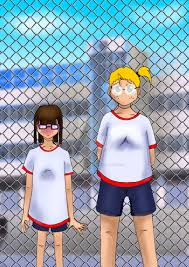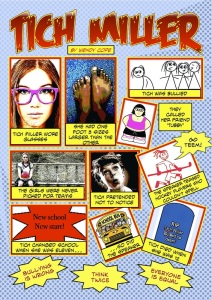This is a great poem! Pupils always love this poem as it is relevant to their lives. It is a poem about a young girl named Tich Miller who gets builled. Tich does not fit in as she has some form of disability.
I have not written a lesson plan in this post as my power point is pretty self explanatory. It has notes and activities.
Click here for my power point: tich_miller_power_point (4)
Some assessment activities included are:
Write a conversation between Tich and Tubby. This conversation could take place in the changing rooms after games.
In groups – Use speech bubbles -choose lines from the poem which reflect the different voices.
The phrase or line which reflects the dominant voice should be written in the biggest speech bubble, and the other voices in the others depending on their significance.
Look up 5 words in a dictionary.
Prepare an interview with the speaker of the poem, ten years later. Ask her to discuss her school life and what she is doing now.
Write a newspaper article about the death of Tich Miller.
Questions about the poem/fll in the blanks.
Tich Miller
Tich Miller wore glasses
with elastoplast-pink frames
and had one foot three sizes larger than the other.
When they picked teams for outdoor games
she and I were always the last two
left standing by the wire-mesh fence.
We avoided one another’s eyes,
stooping, perhaps, to re-tie a shoelace,
or affecting interest in the flight
of some fortunate bird, and pretended
not to hear the urgent conference:
‘Have Tubby!’ ‘No, no, have Tich!’
Usually they chose me, the lesser dud,
and she lolloped, unselected,
to the back of the other team.
At eleven we went to different schools.
In time I learned to get my own back,
sneering at hockey-players who couldn’t spell.
Tich died when she was twelve.
by Wendy Cope
My analysis of the poem
This poem deals with the cruelty of schoolchildren and the way in which young people can feel isolated from their peers. The opening lines of the poem introduce Tich immediately to us. The use of her name, as opposed to simply calling her ‘A girl in my class’ makes us feel connected with the subject of the poem and brings a note of reality to the topic. We know the girl’s name, and this brings her to life for us, in a way. She is not just a statistic or an anonymous sufferer of bullying or isolation: she is a real girl. Tich is described as wearing glasses in a sickly colour of pink: the colour of elastoplast. There is nothing attractive about this image and we may well wonder at this stage about the poet’s intentions. Is she setting out to mock Tich? She is not, although Tich’s peers in the poem do. Tich’s unfortunate appearance is conveyed again in the third line when we learn that one of her feet was three sizes larger than the other. There is something almost humorous about this image, but not quite. The poet’s language is simple and we are faced with a young girl who is almost clownish, but whose situation arouses our sympathy rather than our laughter. The simplicity of the language throughout the poem conveys the simplicity of the language and thought process of young children, while also forcing us to face the issues being dealt with. It is very thought provoking. There is no flowery language, no euphemisms to hide the harsh reality.
In the second stanza, the poet relates herself to Tich. When it came time to choose team members for games, the poet and Tich were always left until last. The mention of the ‘wire-mesh fence’ makes us think of prison, or a cage. The pair are trapped in their bodies and trapped in their shared plight. They cannot escape the embarrassment which befalls them week in, week out. The use of the word ‘always’ suggests that this humiliation was a very common occurrence. Perhaps it happened weekly in P.E class. Although Tich and the poet were united in their distress, they were not closer because of it. They avoided making eye-contact with one another and pretended to tie a shoelace which did not need to be re-tied rather than talk to one another. Perhaps they wanted to avoid facing the fact that they were both rejected by their classmates, or perhaps they did not want to be seen to be connected in any way/have any similarities. The poet says that another avoidance tactic was to pretend to be interested in the flight of a bird overhead. The bird is described as ‘fortunate’. It can fly away; it can escape any tormentors. The girls cannot. Also, the bird is graceful and elegant, unlike Tich and the poet who are both awkward. By looking at the bird, they can also fool themselves and others into believing that they can’t hear the ‘urgent conference’ of the other girls deciding which of the pair is the lesser of two evils. Neither is wanted, but one must be chosen. We learn for the first time that the poet was a fat child: the others call her ‘Tubby’. Nobody seems to want either and they argue amongst themselves, within earshot of the rejected girls.
The poet tells us that ‘usually’ she was chosen: not because she was wanted, but because she was not quite as bad as Tich. The word ‘usually’ again reinforces the idea that this humiliation was very common during the girls’ early school days. Tich, being the last one left, had no choice but to ‘lollop’ to the back of the other team, even though they had not selected her. She had to join their team simply because no-one chose her. The onomatopoeic word ‘lolloped’ suggests Tich’s graceless way of moving. Again, it might be humorous in another context, but it is not here. We can visualise her slow progress to the back of the group all too clearly and imagine the tortuous slowness of her gait and her awkward run.
For the poet, things changed. She moved on to a different secondary school and she learned to use her academic ability to get her own revenge on the sporty types who had sneered/builled at her in earlier days. It is interesting to note that the poet found a different way to bully, but did not learn that mockery is cruel and should be avoided. Like so many people who are picked on, she found her own way to do that to others.
At this point in the poem, there is a complete stop and a break before the last line, which stands alone. This adds dramatic effect and makes us really concentrate on what is about to be said. What follows is a simple one line 6 word statement. ‘Tich died when she was twelve.’ There is no comment on simple sentence. There is no judgement either but we are saddened by the fact that although the poet found her own way to cope, sadly Tich never did. Her very short life ended without her ever managing to be respected or liked by the other girls. She never made any friends. Just as Tich could not avoid her fate, we cannot avoid the tragedy of this sad ending. There is no attempt to soften the blow or to explain what happened. The last line is very important. The fact that the last line stands alone symbolises Tich’s standing alone, unwanted and unselected to the end of her brief, lonely life.
Themes:
- School
- Youth
- Bullying
- The misery of being left out and alienated at school.
- The cruelty of schoolchildren.
- Embarrassment/Humiliated –The girls are embarrassed they are picked last.
Repetition: Repetition is used to good effect in the poem too: the use of the word ”always” suggests that this ritual humiliation was a common occurrence. The poet uses Repetition in the poem. “No, no, have Tich!” The poet uses repetition in the poem to show the reader that Tich was bullied harshly in school. It is used to emphasis this point as alliteration is doing in the above paragraph. This is effective because it creates a sad atmosphere in the poem.
Onomatopoeia: Tich, being the last one left, had no choice but to ”lollop” to the back of the other team, even though they had not selected her. The onomatopoeic word ”lolloped” suggests Tich’s graceless way of moving. Again, it might be humorous in another context, but it is not here. We can visualise her slow progress to the back of the group all too clearly. It does not require a lot of imagination to picture the expressions on the other girls’ faces as they watched her awkward run.
Tone: The opening lines introduce Tich immediately. The tone of the poem is conversational and matter-of fact. The use of Tich’s name, as opposed to simply calling her ”A girl in my class” makes us feel connected with the subject of the poem and brings a note of reality to the topic. We know the girl’s name, and this brings her to life for us, in a way. She is not just a statistic or an anonymous sufferer of bullying or isolation: she is a real girl.
Another tone of the poem is sadness, which is illustrated in the two last stanzas. The tone is sadness because the girl telling the story eventually went on to bully others, getting revenge on those who had bullied her while Tich died when she was twelve. She could have died from different causes but it somewhat implies that she had committed suicide. “At eleven we went to different schools. In time I learned to get my own back, sneering at hockey-players who couldn’t spell.” “Tich died when she was twelve.” The fact the poet wrote the poem shows that she cared about Tich. They are united in their distress but they are not close.


This helped me soo much! thankyou
LikeLike
An excellent summary…. really gets to the heart of the poem
LikeLike